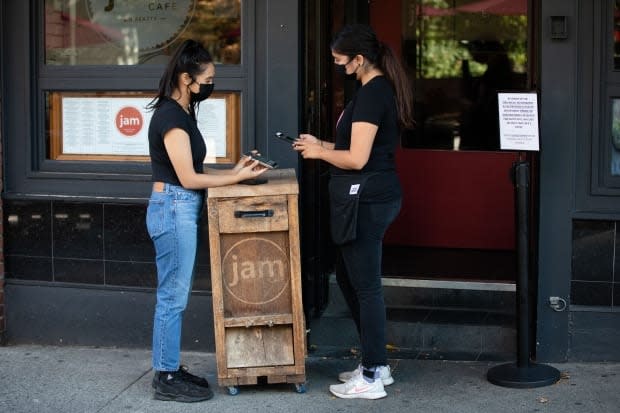$50K per year dishwashing job sign of labour shortage in restaurants, industry expert says

A restaurant in Vancouver's Kitsilano neighbourhood spent three months trying to lure new dishwashers with the promise of a full-time, permanent job earning more than $50,000 per year.
The $25-per hour wage Handi Grill was offering is well above the $15.20 minimum wage for a dishwashing job and a sign of how desperate restaurants are for kitchen staff during an ongoing labour shortage, according to an industry advocate.
Mark von Schellwitz, vice president with Restaurants Canada, says most of his organizations 30,000 members are struggling to rehire staff in the wake of ongoing COVID restrictions.
He says the sweet salary for pot scouring is a sign of the times.
"It doesn't surprise me, because it reflects the labour shortage that we had before the pandemic that's been exacerbated by the pandemic," said von Schellwitz.
Labour leaders agree the pandemic made things worse, but say there was a problem with how staff were valued long before COVID-19 crashed many kitchens.
The restaurant industry in Canada was already short 60,000 kitchen and food service workers before the pandemic. Now, that has more than doubled, to about 130,000, according to Restaurants Canada data.

While Handi Grill removed its long-running job posting Friday, he says lots of restaurants are offering perks to try to lure staff back after initial lockdowns and ongoing layoffs.
For many, the new surge of COVID-19 variants and the stress of enforcing restrictions is just another straw on the backs of restaurants and their exhausted workers. New government aid promised for battered businesses can't roll out fast enough, said von Schellwitz.
Restaurants Canada data shows that seven out of ten of its members rely on COVID wage subsidy programs.
Finance Minister Chrystia Freeland and Prime Minister Justin Trudeau said those COVID support programs expire Oct. 23 but will replaced with new aid for hard-hit businesses.
'Life line' coming
After Friday, the Canada Recovery Benefit wage subsidy will give way for a new $7.4-billion program.
The Tourism and Hospitality Recovery Program will pay wages and rent subsidies of up to 75 per cent to hotels, tour operators, travel agencies and restaurants. A separate Hardest-Hit Business Recovery Program will provide subsidies of up to 50 per cent for other businesses that have faced deep losses.

"Certainly, that's a lifeline because we've got seven out of ten of our industry operators that are still using the service grants and wouldn't be able to survive without them," said von Schellwitz.
At the same time, he said that 90 per cent of Restaurant Canada members can't find enough staff and some are trying to lure back workers they had to lay off, with everything from bonuses to free meals.
In B.C., he said, the average starting wage is also higher than the provincial minimum of $15.20, closer to $16.70.
Eateries are also trying to recruit teens using flyers and perks, eager to tap into an estimated 100,000-person workforce that may be hungry for jobs.
But still, they are coming up short.
Shortage is 'problem of their own making,' says hospitality union
For many people laid off across Canada when the pandemic first hit, it was a time to rethink their job options and upgrade skills or retrain for a new profession.

Some are refusing to return to low paid food-service jobs which can come with a side of overwork and poor treatment.
Then, there's the added stress of now checking vaccination passports and dealing with potentially irate customers who do not want to mask or show identification.
Stephanie Fung, communications organizer with Unite Here Local 40, says the job offer of $25 per hour for dishwashing is a bit of a "unicorn," as she is doubtful such opportunities will last in the hospitality industry her union represents.
She also has questions about how much work that job, at that level of pay, would demand.
"The money is great, yes, but what kinds of jobs will these people be going back to, because it is difficult work. These types of jobs should be properly valued and it shouldn't take a pandemic to address this," said Fung.
She pointed out that restaurant owners terminated large numbers of people when the pandemic began, but she believes, in some cases, it was just an excuse to cut staff.
Fung says that turned some staffers off, for good.
"Really the labour shortage is a problem of [the restaurant industry's] own making."



